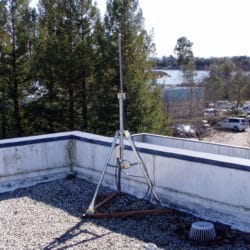Home › Forums › Mayfly Data Logger › XBee Networks of Mayfly Loggers – 900Mhz › Reply To: XBee Networks of Mayfly Loggers – 900Mhz
I was wondering @shicks do you have any references to the XBP900 driver code on the mayfly. Since you’ve put the infrastructure in place be nice to have a starting poi
I was wondering @shicks do you have any references to the XBP900 driver code on the mayfly. Since you’ve put the infrastructure in place be nice to have a starting point :). Thanks for the reference to the Uno. Interesting what you can do on an Uno.
Same observation about 2.4GHz in a forest – the 2.4G gets absorbed by water – ie leaves.
I used two XBP900 in a point-2-multipoint with an Lantronix XPORT AR, that delivered the UART serial data to a destination port – that was then processed into a mysql record.
The wire protocol used a TinyOS packet structure which could support a mesh. For a mesh the power usage and network maintenance considerations get more complicated.
The multi-point was a “gateway” that was at buildings that had power and internet access. So from the building antenna position the Line Of Sight for a standard XBP-900HP is about 9miles in a radius from that point – and can support 16bit addressing (65K) end point nodes.
In one location there was a slight ground hump in the way and it was on the edge of the range. I made sure the RSSI was part of the reported signal to be able to monitor it.
There are websites out there that can analyze elevation profile between two points to determine if there is an LOS.
Now-days I’m looking at a PocketBeagle with a Ethernet module and POE splitter
PocketBeagle-SC-569
MIKROE-971

 Welcome to EnviroDIY, a community for do-it-yourself environmental science and monitoring. EnviroDIY is part of
Welcome to EnviroDIY, a community for do-it-yourself environmental science and monitoring. EnviroDIY is part of 